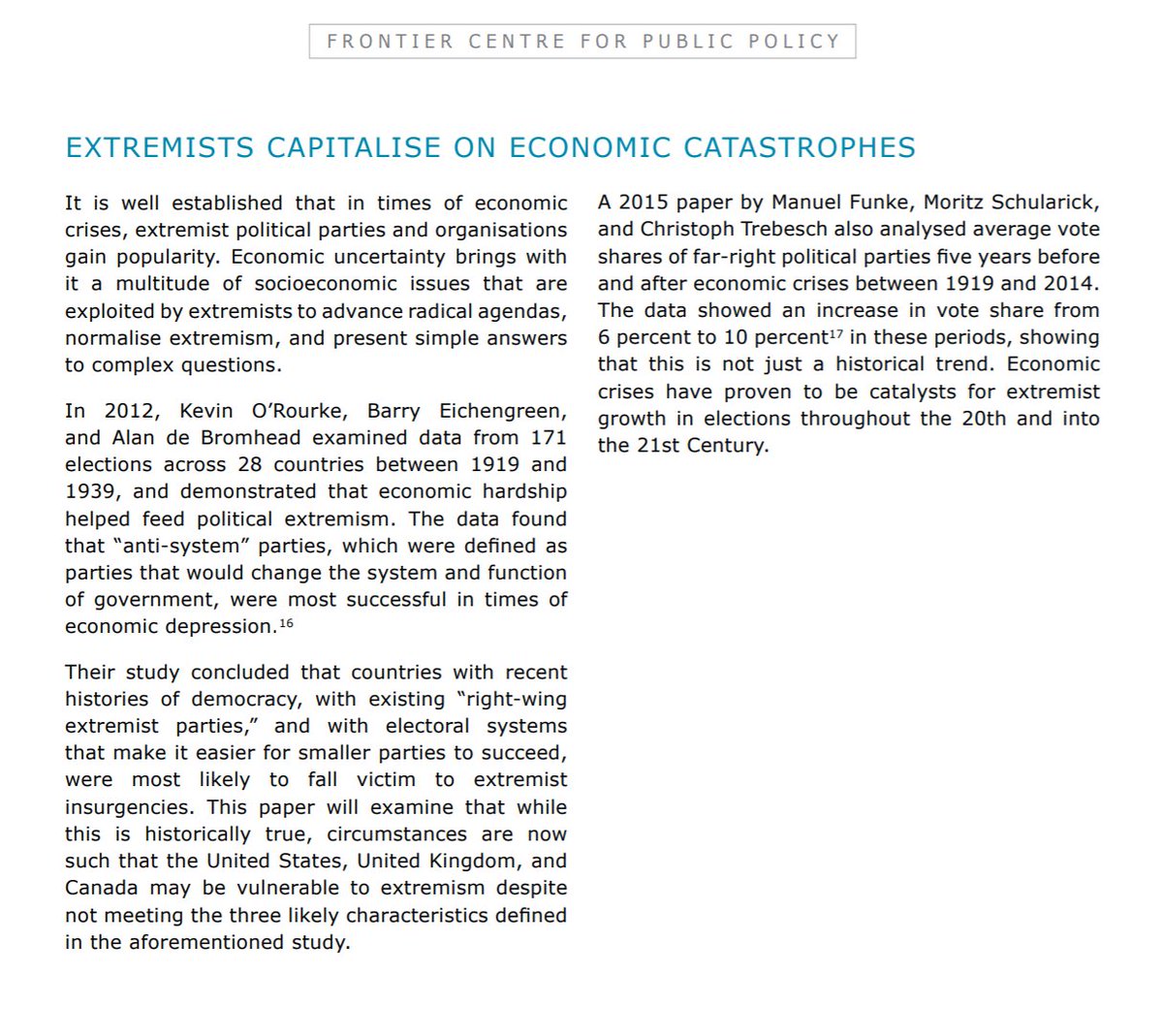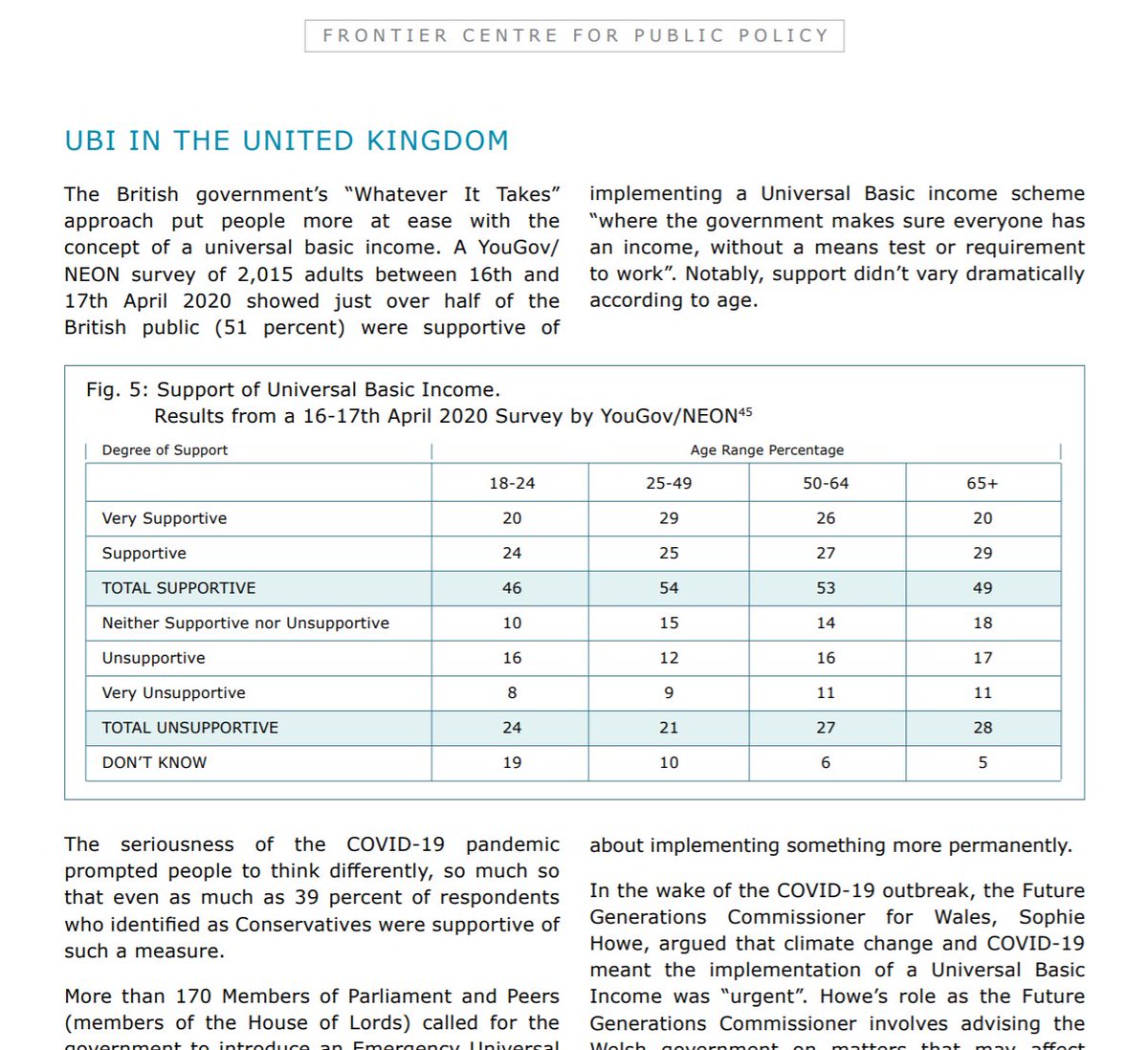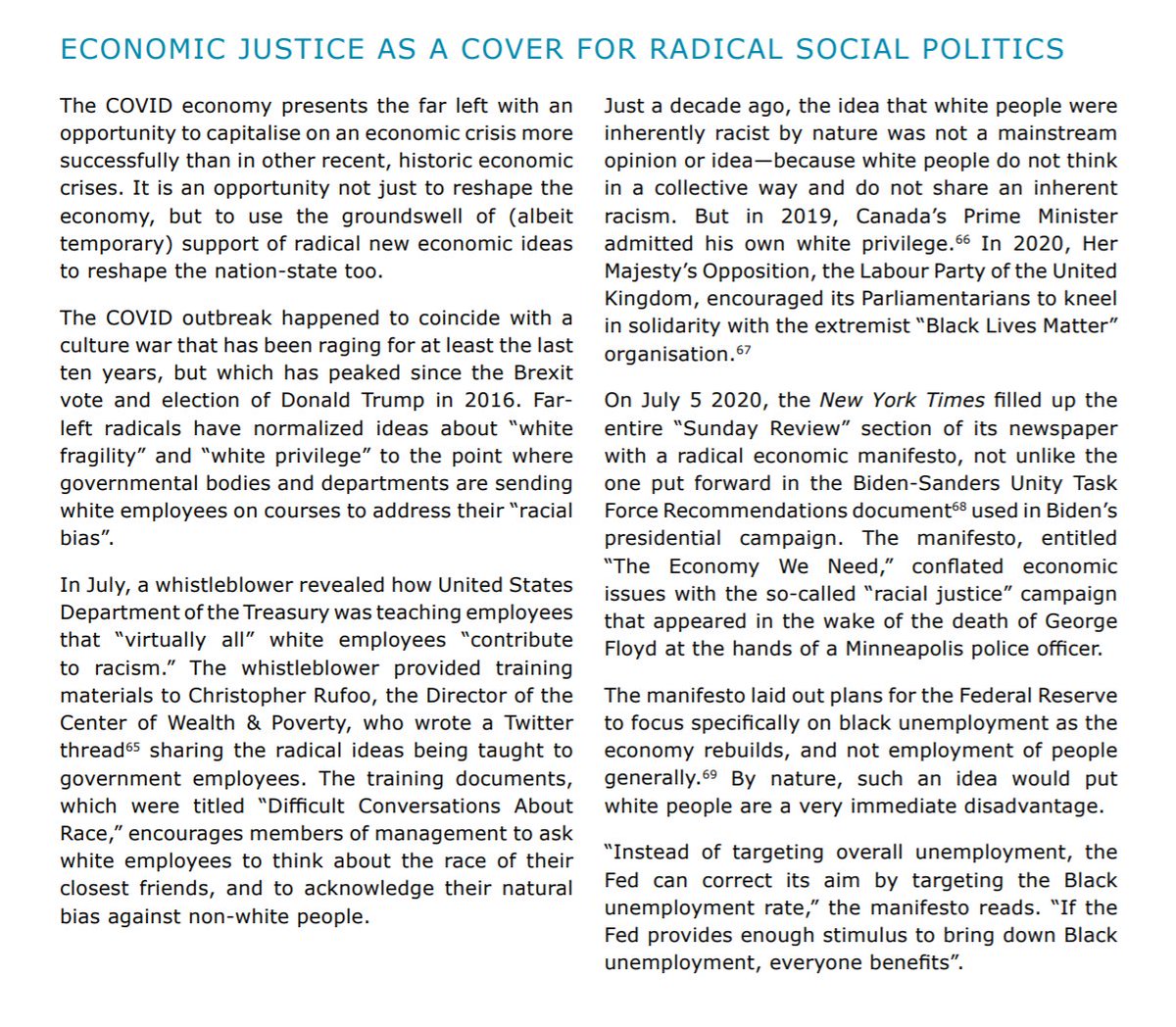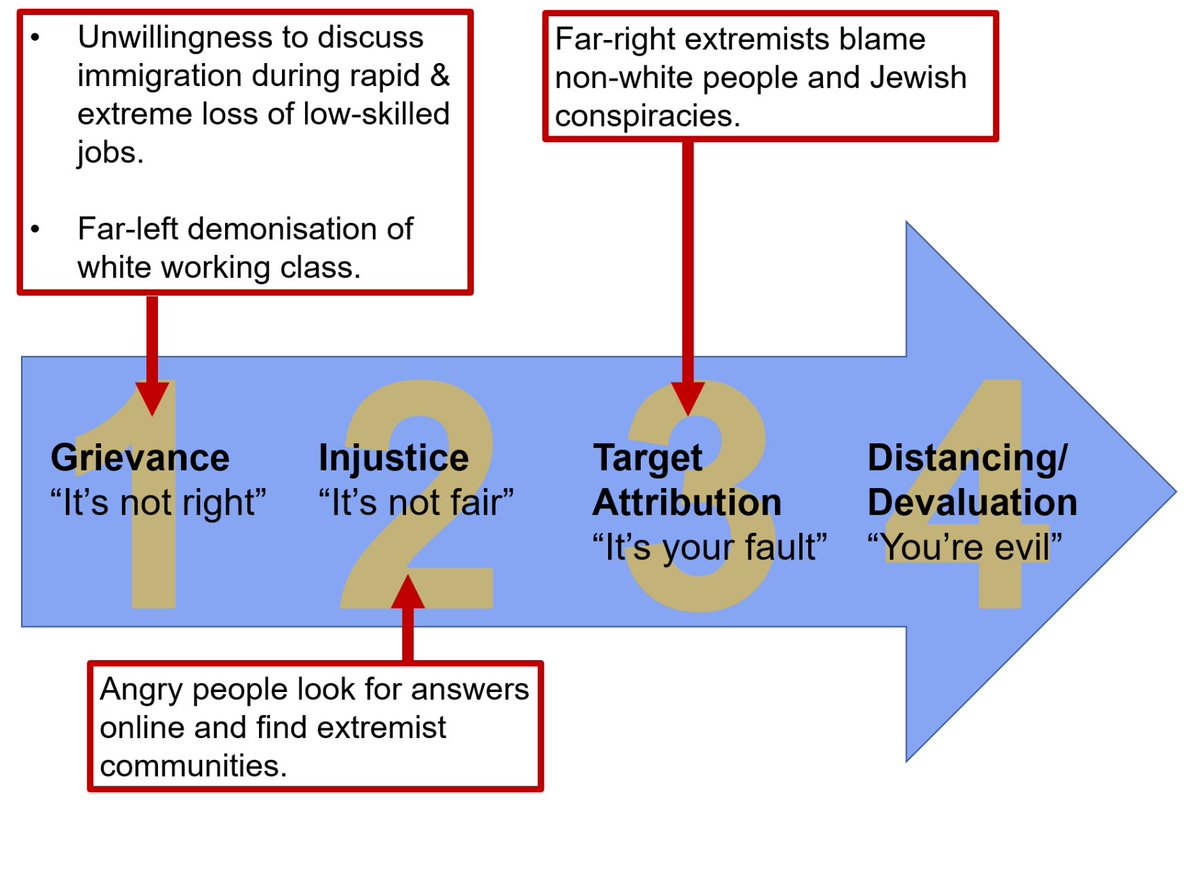Far-left and far-right extremists are using the COVID economy to normalise radical/race-based economic & social policy, and to recruit.
My research paper for @FrontierCentre explains how they& #39;re doing it, & how it could be stopped.
https://fcpp.org/2020/09/04/extremist-opportunism-in-the-covid-economy/">https://fcpp.org/2020/09/0...
(Pls RT!)
THREAD:
My research paper for @FrontierCentre explains how they& #39;re doing it, & how it could be stopped.
https://fcpp.org/2020/09/04/extremist-opportunism-in-the-covid-economy/">https://fcpp.org/2020/09/0...
(Pls RT!)
THREAD:
Far-left extremists are using the COVID economy as cover for reenvisioning society based on racial lines.
On the flip side, history shows that anti-system far-right parties (not conservatives, but extremists) capitalise best on economic depression.
On the flip side, history shows that anti-system far-right parties (not conservatives, but extremists) capitalise best on economic depression.
Between 1919 and 2014, far-right parties saw vote share increase from six to 10 percent 5 yrs before and after economic crises.
Far-left parties have historically been incapable of capitalising on economic crises as effectively, but the COVID economy has increased support of radical economic policies that are usually unpopular.
This gives them a unique opportunity to implement "transformative change" in 2020 and beyond.
YouGov data shows that acceptance of UBI in the UK shot up in April 2020 (COVID outbreak) to 51%, with support even from conservatives and capitalists. Also young and old.
YouGov data shows that acceptance of UBI in the UK shot up in April 2020 (COVID outbreak) to 51%, with support even from conservatives and capitalists. Also young and old.
Since then, the idea of "economic restructuring" has been pushed by mainstream leftists (Biden) and extremist leftist pundits & outlets.
November pres election is important to the radical left as it is their chance to change history & capitalise on economic downturn effectively for once.
Hence Trump& #39;s need to promote the v-shaped recovery.
Hence Trump& #39;s need to promote the v-shaped recovery.
One such example of using the COVID economy to promote far-left/racist ideas is the suggestion in a manifesto published by the @nytimes that rebuilding post-COVID should mean wiping all consumer debt for black customers, providing interest-free mortgages to black people, and…
…eliminating banking fees for black customers.
Meanwhile, authorities appear to be underestimating the real threat of the far right during the COVID economy, focusing on trivial anti-lockdown campaigns from largely unknown groups. This report demonstrates hysteria from…
Meanwhile, authorities appear to be underestimating the real threat of the far right during the COVID economy, focusing on trivial anti-lockdown campaigns from largely unknown groups. This report demonstrates hysteria from…
…"counter-extremism" organisations fearful over anti-lockdown stickers placed on lampposts by far-right groups in London, rather than addressing even RECENT history showing genuinely extreme far-right groups capitalising off the back of an economic downturn.
The 2008 crash significantly bolstered the growth of the far-right British National Party, which gave working-class people concerned about immigration and unemployment an outlet.
They also happened to be a party rooted in neo-Nazism but with a new presentable face.
They also happened to be a party rooted in neo-Nazism but with a new presentable face.
The growth of the BNP correlated directly to the & #39;08 crash, which matches up with historical data.
The far right gains when the economy struggles.
But in 2020, we have a struggling economy combined with a left-right culture war. This presents new problems.
The far right gains when the economy struggles.
But in 2020, we have a struggling economy combined with a left-right culture war. This presents new problems.
Far-left radicalism on the streets (Black Lives Matter & Antifa destroying cities) combined with an economy hurting low-wage and low-skilled workers the most presents an ideal opportunity for the genuine far-right to grow & recruit.
This is a more concerning prospect than anti-lockdown stickers placed by largely unknown groups on lampposts.
Political leaders or "counter-extremism" writers/activists are pushing weak arguments for the sake of ease/narrative. The problem is much bigger.
Political leaders or "counter-extremism" writers/activists are pushing weak arguments for the sake of ease/narrative. The problem is much bigger.
Should the left-right culture war continue to be waged, and should temporary immigration reform be dismissed as racist at a time of extreme economic hardship, many people (often young white men) are left with nowhere to go but the far right.
Why push them there?
Why push them there?
This paper uses a four-point model of radicalisation (Prof Borum, Uni of Florida) to map how the COVID economy could push more people to the far-right, and the role far-left "transformative change" policy (and riots) has to play in that.
To solve these problems - meaning ensuring that people are not fooled by lies told by far-left radicals using the COVID economy to radicalise/recruit/and transform, as well as stopping young men flocking to the far right - this paper makes a series of proposals.
These proposals revolve around the following ideas:
1. Addressing grievances with weekly economic press briefings that would level with the public on the harm done to the economy, why it happened, and how lockdown & government spending counter-measures have caused long-term damage.
Focusing solely on economic recovery isn& #39;t good enough.
People need to know why this crash happened so they are armed with the knowledge to counter communists & radical socialists seeking to capitalise on discontent.
People need to know why this crash happened so they are armed with the knowledge to counter communists & radical socialists seeking to capitalise on discontent.
2. Addressing the sense of injustice with meaningful policy and a willingness to listen.
Now more than ever politicians must consider dropping some petty political issues and working on a bi-partisan basis. Treat this pandemic like wartime.
Now more than ever politicians must consider dropping some petty political issues and working on a bi-partisan basis. Treat this pandemic like wartime.
Usual squabbles over immigration should be put aside for the national good.
Demonising people (of all races) who want (at least) temporary immigration reform to tackle joblessness does nothing to help, makes people feel helpless, and is great propaganda for the far right.
Demonising people (of all races) who want (at least) temporary immigration reform to tackle joblessness does nothing to help, makes people feel helpless, and is great propaganda for the far right.
This must also mean resisting the normalisation of race-based economic/social policy from the radical left.
3. Addressing "target attribution" (third stage of radicalisation process/model) through social media and awareness campaigns.
The public must know that this economy hurts for everybody.
The public must know that this economy hurts for everybody.
Public awareness campaigns must reaffirm government commitment to rebuilding an economy for everybody, not just people from protected/minority classes.
It must also undercut the arguments used by both far-left and far-right radicals by addressing them head-on.
It must also undercut the arguments used by both far-left and far-right radicals by addressing them head-on.
For a more detailed analysis, please read the full paper I published with @FrontierCentre and please share! https://fcpp.org/2020/09/04/extremist-opportunism-in-the-covid-economy/">https://fcpp.org/2020/09/0...

 Read on Twitter
Read on Twitter





